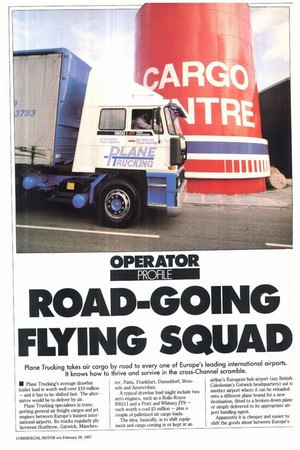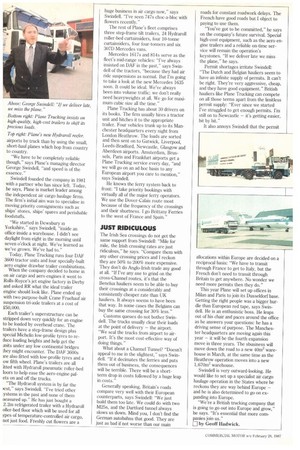ROAD GOING FLYING SQUAD
Page 35

Page 36

If you've noticed an error in this article please click here to report it so we can fix it.
Plane Trucking takes air cargo by road to every one of Europe's leading international airports. It knows how to thrive and survive in the cross-Channel scramble.
• Plane Trucking's average drawbar trailer load is worth well over 210 million — and it has to be shifted fast. The alternative would be to deliver by air.
Plane Trucking specialises in transporting general air freight cargos and jet engines between Europe's busiest international airports. Its trucks regularly ply between Heathrow, Gatwick, Manches ter, Paris, Frankfurt, Dusseldorf, Brussels and Amsterdam.
A typical drawbar load might include two aero engines, such as a Rolls-Royce RB211 and a Pratt and Whitney JT9 — each worth a cool E5 million — plus a couple of palletised air cargo loads.
The idea, basically, is to shift equipment and cargo coming in or kept at an airline's European hub airport (say British Caledonian's Gatwick headquarters) out k another airport where it can be reloaded onto a different plane bound for a new destination, fitted to a broken-down plane or simply delivered to its appropriate airport handling agent.
Apparently it is cheaper and easier to shift the goods about between Europe's Bottom right: Plane Trucking insists on high-quality, high-cost trailers to shift its precious loads.
Top right: Plane's new Hydraroll reefer.
airports by truck than by using the small, short-haul planes which hop from country to country.
"We have to be completely reliable though," says Plane's managing director George Swindell, "and speed is of the essence."
Swindell founded the company in 1981 with a partner who has since left. Today, he says, Plane is market leader among the independent air cargo haulage firms. The firm's initial aim was to specialise in moving priority consignments such as ships' stores, ships' spares and perishable foodstuffs.
"We started in Dewsbury in Yorkshire," says Swindell, "inside an office inside a warehouse. I didn't see daylight from eight in the morning until seven o'clock at night. We've learned as we've grown. We've had to."
Today, Plane Trucking runs four DAF 3600 tractor units and four specially-built aero engine drawbar trailer combinations.
When the company decided to home in on air cargo and aero engines it went to Rolls-Royce's jet engine factory in Derby and asked RR what the ideal trailer engine should look like. Plane ended up with two purpose-built Crane Fruehauf air suspension tri-axle trailers at a cost of £50,000.
Each trailer's superstructure can be stripped down very quickly for an engine to be loaded by overhead crane, The trailers have a step-frame design plus special Michelin low-profile tyres to reduce loading heights and help get the units under any low continental bridges they might encounter. The DAF 3600s are also fitted with low-profile tyres and a ow fifth wheel. Plane's trailers are all itted with Hydraroll pneumatic roller-bed loors to help ease the aero engine palets on and off the trucks.
"The Hydraroll system is by far the iest," says Swindell. "I've tried other ,ystems in the past and none of them neasured up." He has just bought a 2,2m refrigerated trailer with a Hydraroll oiler-bed floor which will be used for all ypes of temperature-controlled air cargo, not just food. Freshly cut flowers are a huge business in air cargo now," says Swindell. "I've seen 747s choc-a-bloc with flowers recently."
The rest of Plane's fleet comprises three step-frame tilt trailers, 24 Hydraroll roller-bed curtainsiders, four 10-tonne curtainsiders, four four-tonners and six 307D Mercedes vans.
Mercedes 1617s and 814s serve as the fleet's mid-range vehicles: "I've always insisted on DAF in the past," says Swindell of the tractors, "because they had air ride suspensions as normal. But I'm going to take a look at the new Mercedes 1635 soon. It could be ideal. We've always been into volume traffic; we don't really need heavyweights at all. We go for maximum cubic size all the time."
Plane Trucking has about 30 drivers on its books. The firm usually hires a tractor unit and hitches it to the appropriate trailer. Four vehicles trunk up to its Manchester headquarters every night from London Heathrow. The loads are sorted and then sent on to Gatwick, Liverpool, Leeds-Bradford, Newcastle, Glasgow and Aberdeen airports. Amsterdam, Brussels, Paris and Frankfurt airports get a Plane Trucking service every day, "and we will go on an ad hoc basis to any European airport you care to mention," says Swindell.
He knows the ferry system back to front: "I take priority bookings with virtually all of the major ferry operators. We use the Dover-Calais route most because of the frequency of the crossings and their shortness. I go Brittany Ferries to the west of France and Spain."
JUST RIDICULOUS
The Irish Sea crossings do not get the same support from Swindell: "Mile for mile, the Irish crossing rates are just ridiculous," he says. "Compare them with any other crossing prices and I reckon they are 50% to 200% more expensive. They don't do Anglo-Irish trade any good at all. "If I've any axe to grind on the cross-Channel routes, it's that the Benelux hauliers seem to be able to buy their crossings at a considerably and consistently cheaper rate than UK hauliers. It always seems to have been that way. In some cases the Belgians can buy the same crossing for 30% less."
Customs queues do not bother Swindell. The trucks usually clear their loads at the point of delivery — the airport. "We seal the trucks from airport to airport. It's the most cost-effective way of doing things."
What about a Channel Tunnel? "Doesn't appeal to me in the slightest," says Swindell. "If it decimates the ferries and puts them out of business, the consequences will be terrible. There will be a shortterm drop in costs followed by a huge leap in costs."
Generally speaking, Britain's roads compare very well with their European counterparts, says Swindell: "We just build them too late. We could do with two M25s, and the Dartford tunnel always slows us down. Mind you, I don't find the German autobahns that good. They are just as bad if not worse than our main roads for constant roadwork delays. The French have good roads but I object to paying to use them.
"You've got to be committed," he says on the company's future survival, Special high-cost equipment, such as the aero engine trailers and a reliable on-time service will remain the operation's keystones. "If we deliver late we miss the plane," he says.
Permit shortages irritate Swindell: "The Dutch and Belgian hauliers seem to have an infinite supply of permits. It can't be right. They're very aggressive, cheap, and they have good equipment." British hauliers like Plane Trucking can compete on all those terms apart from the limitless permit supply: "Ever since we started I've struggled to get enough permits. I'm still on to Newcastle — it's getting easier, bit by bit."
It also annoys Swindell that the permit allocations within Europe are decided on a reciprocal basis: "We have to transit through France to get to Italy, but the French don't need to transit through Britain to get anywhere. No wonder we need more permits then they do."
This year Plane will set up offices in Milan and Paris to join its Dusseldorf base. Getting the right people was a bigger hurdle than European red tape, says Swindell. He is an enthusistic boss. He leaps out of his chair and paces around the office as he answers your questions: he has a driving sense of purpose. The Manchester headquarters are moving again this year — it will be the fourth expansion move in three years. The sbusiness will move down the road to a new 40m2 warehouse in March, at the same time as the Heathrow operation moves into a new 1,670m2 warehouse.
Swindell is very outward-looking. He would like to set up a specialist air cargo haulage operation in the States where he reckons they are way behind Europe — and he is also determined to go on expanding into Europe.
"We're a British trucking company that is going to go out into Europe and grow," he says. "It's essential that more companies join us."
by Geoff Hadwick.
















































































































